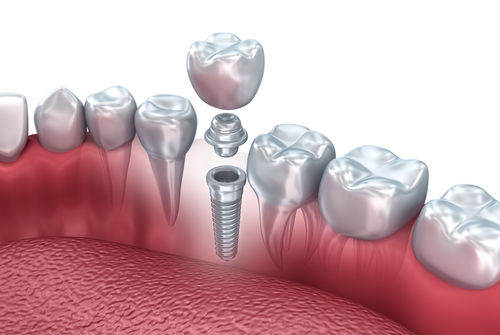When deciding between bridges and dental implants Manassas residents must take into account the benefits and drawbacks of each type of treatment so that they make an informed decision about their appearance and oral health. Here’s a look at the differences between dental implants and bridges.
Dental Implants
If you have severe gum disease, or lose your teeth for some reason, implants are probably your best choice if they are feasible. Each dental implant will be supporting a dental crown with a titanium metal post that functions like a tooth root to anchor the entire structure.
Once the initial titanium metal post has been placed, it will anchor the two additional components of the implant: an abutment and crown. The abutment is simply an intermediate structure that allows a crown to be fitted onto it.
Dental Bridges
Bridges were once the only treatment option to “bridge” a gap between teeth. Although they are not as popular, bridges are still used today.
A bridge is not a replacement for a natural tooth, as with dental implants. They rely upon neighboring teeth as a buttress for the attachment of a dental crown filling the space left by the missing tooth.
Comparing Dental Implants and Bridges
Cost is a big factor for many patients when it comes to comparing implants and bridges. Implants typically cost more than dental bridges, particularly if more than one is required. Bridges are normally covered by insurance, but implants rarely are.
Getting a new dental bridge does not typically take as long as receiving a dental implant. Getting implants require multiple dental appointments and a wait of several months while the jawbone naturally fuses around the titanium post.
Dental bridges are less durable than dental implants, which can be expected to last for a lifetime if you care for them properly. Bridges typically last around 10 years.
Dental Bridges Pros:
- Jaw bone density is not a factor.
- No surgery required.
- Less expensive.
- Less invasive.
Dental Bridges Cons:
- Without an artificial tooth root, the jawbone will deteriorate.
- Neighboring teeth are more susceptible to tooth decay. Also, some tooth structure will need to be removed for the placement of the bridge.
- Lifespan: Lasts for about 10 years.
Dental Implant Pros:
- Easy to care for, requiring little maintenance.
- Long lasting and durable.
- More secure and stable.
- Function, feel and appear like a natural tooth.
- Prevents bone loss.
- Protects surrounding teeth, which are not placed under additional strain.
Dental Implant Cons:
- More expensive.
- Treatment takes longer.
Dental Implants or Bridges: Which Is Right for Me?
Ultimately, to determine which treatment is right for you can be determined in a consultation with your dentist. To receive more information about bridges or dental implants, Manassas residents are encouraged to contact our dental office today to schedule a convenient consultation.









